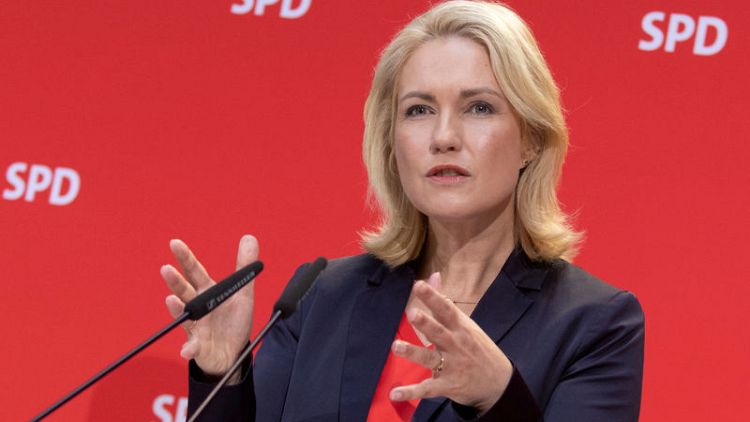BERLIN (Reuters) - A widely respected caretaker leader of Germany's Social Democrats (SPD), junior partner in Chancellor Angela Merkel's coalition, is standing down for health reasons, dealing the party a blow as it tries to recover from months of turmoil.
Manuela Schwesig said on Tuesday a diagnosis of breast cancer had prompted her decision to stand aside as one of three interim leaders as the SPD selects a permanent chair and decides whether to continue in coalition with Merkel.
Several senior party figures had encouraged Schwesig, 45, to stand as permanent leader but she declined, saying she wanted to focus on her role as premier of the eastern state of Mecklenburg-Vorpommern, a role she has held for about two years.
"The good news is this cancer is curable. But medical treatment is necessary," Schwesig said in a statement to her colleagues, adding she would keep her role as state premier and head of the party there.
The deeply divided SPD is in the midst of a protracted leadership race after its worst ever performance in elections to the European Parliament in May forced Andrea Nahles to quit as party leader. The SPD is polling at around 14%, just off all time lows.
The final result of the leadership contest and a decision on whether to stay in government with Merkel will be taken by delegates at a party conference in December. A move to ditch the coalition could lead to a snap election in Europe's biggest economy, or a minority government..
Schwesig has been a rising star in the SPD, becoming a minister in Mecklenburg-Vorpommern at the age of 34.
Just five years later she was a cabinet minister, responsible for family policy under Merkel and many in the SPD have pinned their hopes on her as a leading figure from the former Communist East.
(Reporting by Madeline Chambers; Editing by Giles Elgood)
